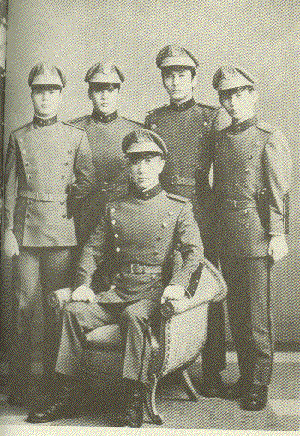Ladies and Gentlemen,
I welcome you to the Museum of European Art on this special occasion. On February 14, 1925 Yukio Mishima, one of the most significant writers in modern Japan, was born into a samurai family. Since youth he was brought up in the spirit of the samurai tradition and values: nobility, truthfulness, complete control over mind and body, and loyalty to the Emperor.
He attended the Peer's School and Tokyo Imperial University, and for a time worked at the Ministry of Finance. But his real calling was literature, and soon he started to devote all of his time and energy to writing. He wrote countless short stories and thirty-three plays, in some of which he also acted.
His first novel, semi-autobiographical Confessions of a Mask, appeared in 1949. Since then he published over a dozen novels, almost all of which were translated into English and other languages during his lifetime. They include: Thirst for Love; Forbidden Colors; Death in Midsummer; The Sound of Waves (a simple love story of a boy and girl in a Japanese fishing village); The Temple of the Golden Pavilion (a brilliant depiction of a psychopathic monk who destroys the temple he loves); After the Banquet (the story of a successful businesswoman who marries an aging politician and attempts to restore his former glory); and the horror tale The Sailor Who Fell from Grace with the Sea. All his novels contain paradoxes: beauty equated with violence and death; the yearning for love and its rejection when offered; and an exquisite attention to detail in the delineation of character.
Mishima's reverence for the Japanese martial arts led him to take up Kendo (a type of fencing, with wooden swords) and karate, as well as body-building, and by 1968 he became a Kendo master of the fifth dan. He also organized a "private army" called the Shield Society. The youthful members practiced physical fitness and the ancient arts of the samurai, such as karate, swordsmanship, and the upholding of the ideals and virtues of the ancient Japanese culture under the Imperial rule.
Mishima's literary masterpiece, however, is the tetralogy The Sea of Fertility, which he conceived in 1964. It consists of four novels: Spring Snow, Runaway Horses, The Temple of Dawn, and The Decay of the Angel.
In the first novel, Spring Snow, set in Tokyo in 1912, the closed world of the ancient aristocracy is being breached for the first time by outsiders -- rich provincial families without tradition, whose money and vitality make them formidable contenders for social and political power.
The second volume, Runaway Horses is the chronicle of a conspiracy. It is a novel about the roots of Japanese sense of honor that led to war, in an era marked by economic depression, social upheaval, and political violence.
The third part, The Temple of Dawn is a story of the pursuit of beauty and spiritual enlightenment. It powerfully dramatizes the Japanese experience from the eve of World War II through the degradation of the postwar era.
The dramatic climax of the tetralogy, The Decay of the Angel synthesizes themes from the three previous novels: the decay of Japan's courtly tradition and samurai ideal; the essence and value of Buddhist philosophy; and, underlying all, Mishima's apocalyptic vision of the modern age.
In 1985, George Lucas and Francis Coppola produced the movie Mishima: A Life in Four Chapters. It is a haunting, lyrical story of the renowned author's life, death, and genius. The movie is as dramatic and complex as the man himself. Its three different visual levels shift between a semi-documentary view of Mishima's last day, black and white flashbacks of his earlier years and stunning representations from three of his novels.
On the morning of his death, the last volume of Mishima's tetralogy, The Sea of Fertility, was delivered to his publisher. It was on November 25, 1970, when Mishima committed seppuku (ritual suicide) as a gesture of public protest against the prevailing political and social conditions in the contemporary Japan. Yukio Mishima, one of Japan's most gifted writers, remained true to his ideal of the "unity of word and deed, the harmony of pen and sword," to the end. Like the a beautiful fireball at night, Mishima brilliantly lit up the dark sky and left us at the young age of 45. Today, he would have been 70 years old.

Mishima (seated) with four the members of the Shield Society: Left to reght: Morita, "Furu-Koga," Ogawa, "Chibi-Koga."
Copyright 2001 West-Art
PROMETHEUS, Internet Bulletin for Art, Politics and Science.